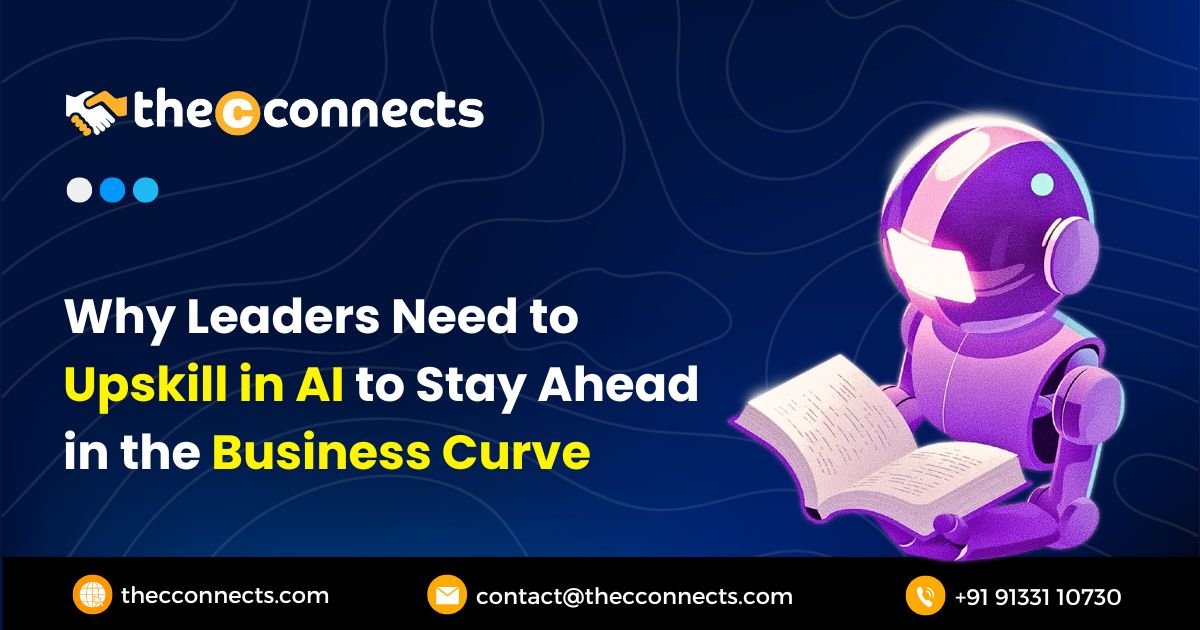In today’s business landscape, Artificial Intelligence (AI) is no longer a futuristic concept; it’s a core driver of innovation and competitive advantage. From automating operations to improving decision-making, AI has become an essential part of how modern organisations function. And for business leaders, understanding AI is no longer optional. Those who adapt to this shift can lead their teams with confidence, while those who don’t risk falling behind in a rapidly changing world.
The Changing Role of Leadership in the Age of AI
Traditionally, leaders relied on experience, intuition, and data from conventional sources to make decisions. Today, the scenario has changed completely. AI-driven insights are transforming the way businesses operate, making leadership more data-informed and technology-centric.
Modern leaders are expected to:
- Understand how AI impacts business operations and customer experiences.
- Drive AI-based initiatives that improve efficiency and innovation.
- Make ethical decisions about automation, data usage, and workforce changes.
This evolving environment calls for leaders who are not only strategic thinkers but also digitally fluent. Understanding AI doesn’t mean becoming a technical expert; it means gaining the perspective to align AI initiatives with organisational goals.
Why Upskilling in AI Is Essential for Leaders
The idea of AI for leaders is about more than just learning a new technology. It’s about developing a mindset that embraces data-driven transformation. Let’s look at why AI upskilling has become a critical need for today’s leaders.
1. Better Decision-Making with Data Insights
AI helps leaders make informed, timely decisions by analysing patterns and trends that are often invisible to the human eye. Leaders who understand AI can interpret these insights effectively and use them to guide strategy, allocate resources, and predict outcomes with more confidence.
2. Driving Innovation Across Teams
AI is opening up new possibilities in every function: marketing, operations, HR, finance, and more. Leaders who understand AI’s potential can encourage teams to experiment, automate repetitive tasks, and build solutions that enhance performance. This ability to connect innovation with business goals is what sets modern leadership apart.
3. Enhancing Customer Experiences
AI-driven personalisation and predictive analytics are reshaping how businesses interact with customers. Leaders who are familiar with AI tools can better design customer strategies, understand user behaviour, and ensure the company delivers experiences that truly resonate.
4. Building a Future-Ready Workforce
As organisations adopt AI, workforce roles and skills are evolving. Leaders must know how to reskill teams, manage transitions, and build a culture of continuous learning. By upskilling themselves first, leaders can set the tone for digital transformation across their organisation.
5. Making Ethical and Responsible AI Choices
AI brings tremendous benefits, but it also comes with responsibility. Leaders play a key role in ensuring that AI systems are transparent, unbiased, and ethical. Understanding AI principles helps leaders set guidelines and make decisions that reflect integrity and accountability.
Expert Insight: Leadership in an AI-Driven World
Industry experts often emphasise that leaders who understand AI are better positioned to shape business strategy. As one senior tech executive put it, “AI doesn’t replace leadership, it amplifies it. Leaders who learn AI can guide their organisations through change instead of being disrupted by it.”
This mindset reflects a shift in leadership style. AI isn’t just a technical upgrade; it’s a strategic enabler. Leaders who learn to interpret AI insights, question data intelligently, and understand the technology’s impact will lead with greater confidence and clarity.
How an AI for Leadership Course Can Help
Many professionals are turning to structured learning options like an AI for leadership course to build the right understanding and confidence. Such programs are designed to help leaders:
- Grasp AI fundamentals in simple, business-relevant terms.
- Explore real-world use cases across industries to see AI in action.
- Develop strategic thinking to identify where AI adds value.
- Collaborate with experts and peers to exchange ideas and perspectives.
These courses often combine theory with practice, enabling leaders to apply what they learn directly to their roles. By investing in such learning, leaders not only future-proof their careers but also position their organisations for sustained growth.
Becoming an AI-Ready Leader
AI is redefining what it means to be an effective leader. It’s not about coding or technical know-how; it’s about understanding possibilities, anticipating change, and guiding teams through transformation.
To stay ahead in the business curve, leaders should:
- Stay curious and open to new technologies.
- Encourage data-driven decision-making within their teams.
- Continuously learn through professional courses and industry engagement.
- Promote ethical and responsible AI practices.
The leaders who embrace AI today will shape the direction of their industries tomorrow. By taking the initiative to upskill and adapt, they’ll not only enhance their own growth but also lead their organisations into a smarter, more innovative future.



